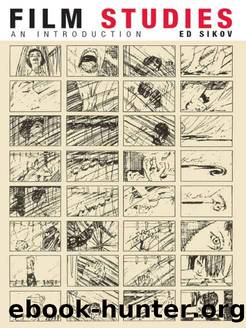Film Studies: An Introduction (Film and Culture Series) by Ed Sikov

Author:Ed Sikov [Sikov, Ed]
Language: eng
Format: mobi
Tags: Performing Arts/Film and Video/General
Publisher: Columbia University Press
Published: 2010-05-31T16:00:00+00:00
SEGMENTATION: FORM
In film studies, a formal analysis of a film’s story and plot is called a SEGMENTATION. Segmentation provides a way to see and understand narrative patterns without being distracted by the tremendous sensory input of the rest of the film—without the loud sounds, exciting physical actions, and bright colors that contribute so much to the pleasure of moviegoing. Segmentations are straightforward, even dry outlines of what takes place in the film’s narrative in the order in which the filmmakers present the events.
You will recall that a film’s STORY is all the events of the narrative as they occur in chronological order from beginning to end, including not only those that we see and hear, but those we infer. The PLOT, on the other hand, is the ordering and structuring of narrative events as they are presented in the film. Segmentations are about plot—the order in which narrative elements occur. If, for example, a killer confesses to his crime in the beginning of the film, after which a series of flashbacks present the events leading up to the murder, a segmentation of the film would begin, just as the plot begins, with the confession. The story, on the other hand, takes a chronological form: it begins with a man embarking on the path that will result in his murdering the victim and ultimately confessing to the crime. The story ends with the confession; the plot—and the segmentation—begin with it.
Film narratives can be long and complicated, so a segmentation of a whole film begins by breaking the narrative down into its largest component parts. Once again, these parts tend to follow the model proposed by Aristotle in the fourth century BCE. These dramatic unities, also known as the classical unities, are (1) the unity of action, meaning that the main character or characters pursue only one goal; (2) the unity of place, which is to say that the action occurs in a single general location; and (3) the unity of time, meaning that the action takes place during a single time period. But while Aristotle’s theory of the dramatic unities sets forth the idea that plays (and, by extension into modern terms, films) should observe all three unities from beginning to end, most films (and many plays) observe only the first unity—that of action. Given cinema’s ability to bring multiple locations and time frames together during the course of their 90-minute or two-hour running time, most films ignore the second and third unities when it comes to the entire film. Within scenes, however, these unities are still observed, and it is on this basis that the largest, most basic individual units of segmentation are concerned.
A segmentation of a well-known movie may make this point clearer. The Wizard of Oz, as we have seen, can be segmented into three broad units based on the unity of space:
Download
This site does not store any files on its server. We only index and link to content provided by other sites. Please contact the content providers to delete copyright contents if any and email us, we'll remove relevant links or contents immediately.
The Kite Runner by Khaled Hosseini(5178)
Gerald's Game by Stephen King(4654)
Dialogue by Robert McKee(4403)
The Perils of Being Moderately Famous by Soha Ali Khan(4220)
The 101 Dalmatians by Dodie Smith(3511)
Story: Substance, Structure, Style and the Principles of Screenwriting by Robert McKee(3468)
The Pixar Touch by David A. Price(3438)
Confessions of a Video Vixen by Karrine Steffans(3308)
How Music Works by David Byrne(3270)
Harry Potter 4 - Harry Potter and The Goblet of Fire by J.K.Rowling(3073)
Fantastic Beasts: The Crimes of Grindelwald by J. K. Rowling(3058)
Slugfest by Reed Tucker(3002)
The Mental Game of Writing: How to Overcome Obstacles, Stay Creative and Productive, and Free Your Mind for Success by James Scott Bell(2908)
4 - Harry Potter and the Goblet of Fire by J.K. Rowling(2702)
Screenplay: The Foundations of Screenwriting by Syd Field(2642)
The Complete H. P. Lovecraft Reader by H.P. Lovecraft(2562)
Scandals of Classic Hollywood: Sex, Deviance, and Drama from the Golden Age of American Cinema by Anne Helen Petersen(2524)
Wildflower by Drew Barrymore(2488)
Robin by Dave Itzkoff(2440)
